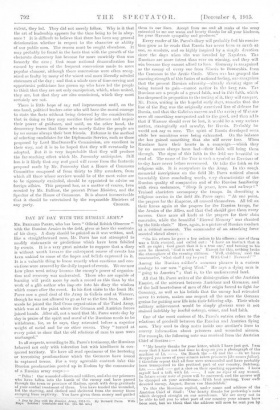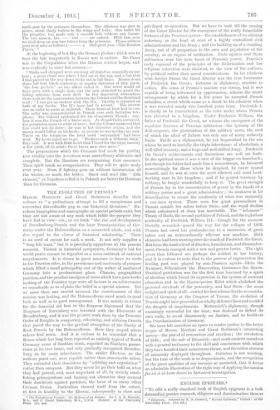DAY BY DAY WITH THE RUSSIAN ARMY.*
MR. BERNARD PARES, who has been " Official British Observer " with the Russian Armies in the field, gives us here the contents of his diary. A diary should be printed as it was written, and, like a straightforward man, Mr. Pares has not attempted to modify statements or predictions which have been falsified by events. It is a very great mistake to suppose that a diary is without worth Lecaese the subsequent course of events has been unkind to some of the hopes and beliefs expressed in it.
It is a valuable thing to know exactly what emotions and con- victions were aroused by the daily impact of events. We see now how plans went astray because the enemy's power of organiza- tion and recovery was underrated. Those who are capable of learning will profit more by such a record as this than by the work of a glib author who imports into his diary the wisdom which comes after the event. In his.first visibs to the front Mr.
Pares saw a good deal of the Army in Galicia and at Warsaw, though he was not allowed to go as far as the first lines. After- wards ho joined the Red Cross organization of the Third Army, which was at the point where the German and Austrian forces joined hands. After all, not a word that Mr. Pares wrote day by
day in praise of the spirit and moral of the Russians needs to be withdrawn, for, as he says, they retreated before a superior
weight of, metal and for no other reason. They " turned at every point to show that the old relations of man to man wore unchanged."
In all respects, according to Mr. Pares's testimony, the Russians behaved not only with toleration but with kindliness in con- quered territory. We have all read specimens of the hectoring or terrorizing proclamations which the Germans have issued in captured towns. For a very agreeable contrast take this Russian proclamation posted up in Radom by the commander of a Russian army corps
Poles ! Our wounded officers and soldiers, and also our prisoners who have fallen into the hands of the enemy and have passed through the town or province of Radom, speak with deep gratitude of your cordial treatment of them. You have tended the wounded, fed the starving, and clothed and sheltered from the enemy those escaping from captivity. You have given them money and guided • Day by Day with the Ituseian Array, 1914.11. By Bernard Pares. With Wave. London ; Constable and Co. 17s. ed. net,' them to our lines. Accept from mo and all ranks of the army entrusted to me our warm and hearty thanks for all your kindness, for your Slavonic sympathy and goodness."
Every reader of Mr. Pares's diary will probably feel his convic- tion grow as he -reads that Russia has never been so mash at
one, no resolute, and so highly inspired by a simple devotion since the days when she was invaded by Napoleon. The Russians are more intent than ever on winning, and they will Will because they cannot afford to lose. Germany is recognized as the enemy of every one from Siberia to Bessarabia. from the Caucasus to the Arctic Circle. When 0:13 has grasped the amazing strength of this fusion of national feeling, ono re cognizes that the present Russian adversity—already showing signs of being turned to gain—ea:mot matter in the long ran. The Russians are a people of a grand faith, and in this faith, which
has deepened in proportion to the testing of it, they will conquer. Mr. Pares, writing in the hopeful early days, rein trks that the line of the Bug was the originally conceived line of (Lance for Russia, and that the Galieivi st1300s3 anal the swills of Warsaw were all something unexpected and to the pod, and then alb that if Warsaw should over be lost, it would be a very serious matter, strategically and morally, for Russia. Probably ho
would not say so now.- TliS spirit of Russia developed oven while her munitions were being exhausted. On the balance she has gained something that she will never lose. When Russians have their hearts in a campaign—which they by no moans always have had—their faith will bring them through. The signs of this faith in the field are beautiful to read of. The name of the Tsar is such a symbol as Russians of to-day have never before reverenced. Or take the faith on its religious side. It is everywhere in the Army. In the rough memorial inscriptions on the field Mr. Pares noticed almost
invariably these concluding words, very characteristic of the Russian quality of compassion and of the Russian familiarity with stern endurance, " Sleep in peace, hero and sufferer ! "
Trained choristers accompany the troops. In describing a religious service in the field Mr. Pares says : " At one point, the prayers for the Emperor, all crossed themselves. All fell on their knees again at the prayers for the Russian troops, for the Armies of the Allies, and that God shonld give them every
success. Once more all knelt at the prayers for their slain comrades, while the beautiful Eternal Memory' was chanted by the little choir." Here, again, is a picture of Russian conduct at a critical moment. The commander of an attacking force scouted ahead alone:—
" On his return he gave a few orders to his officers ; one of them was a little excited, and called out : ' I have an instinct that it will go right ; God grant that it is a true one,' and turning to his men he shouted, God is with us.' Except for this, nothing broke
the atmosphere of the evening :stillness. Well, children,' said the commander, what shall I say to you ? With God ! Forward!' "
Among tho Russian soldier's common phrases is a curious analogy to our own "going West." He says a dying man is " going to America " ; that is, to the undisoonrod land.
All that Mr. Pares writes of the disintegration of the Austrian Empire, of the mistrust between Austrians and Germans, and of the half-heartedness of men of Slav origin forced to fight for Germany, as well as his beliefs that the enemy had retreated never to return, makes one respect all the more the German genius for putting new life into their faltering ally. Their whole military achievement would be simply glorious were it not stained indelibly by fearful outrage, crime, and bad faith.
One of the most curious of Mr. Pares's entries refers to the relations of goodwill between the Rusdan and Austrian flying men. They used to drop notes inside one another's linos to convey information about prisoners and wounded airmen.
For example, the following note was received from the Austrian Chief of Section :—
" Msr hearty thanks for your letter, which I have just got. I am sorry that I have not had time to drop on you a photograph of the machine of Lt. —. On March the —tit and the —th we have dropped you news of your airmen taken prisoners [the names follow]. I therefore repeat that all four were unwounded and have probably boon transported to the prettiest part of our country, Salzburg. Lts. — and — got a shot on their sparking apparatus. 1 have myself had a talk with Lt. —. I saw no sipms of any wound. In future every note of yours will be answered, and the answer will be dropped on your aerodrome.—With best greeting, Your ever devoted enemy, August, Baron von Mandelelob,'
To this the Russians replied, under name and address of the Austrian Chief of Stall ' Our hearty thanks for yesterday's note which dropped straight on our aerodrome. Wo are sorry not to be able to tell you to what part of our country your airmen have been sent, but we think that the address will soon be sent you by earth-post by the prisoners themselves. Tho Albatross was shot to pieces, about thirty bullets in the wings and body. One bullet hit the propeller, but made only a smooth hole without any fissure. The two airmen, Lts. — and — are unhurt. With this note we shall drop on you two letters from the prisoners. Please address
Four next note as follows ( ). God greet you.—Tho Russian lyers.' " At the beginning of last May the German phalanx which was to turn the tide temporarily in Russia was in motion. Mr. Pares was in the Carpathians when the Russian retreat began, and was evidently in some hot corners :- " Shells and shrapnel were crashing all round us, especially on our rear ; a great cloud rose whore I had sat at the top, and a but that I had passed on the way down broke out in full flame. Nearer down there fell four black explosives at regular distances of fifty yards, ' the four packets' as one officer called it. Our cover would all have gone with a single shot, and the men crouched to avoid the fulling splinters from each shell. In this depressing atmosphere there wont on the conversation between the Colonel and the divisional Et:di I can get no contact with the It's. Cavalry is reported on both of my flanks. The R's have had to retreat.' The answer was an order to retire at nightfall. Three hours at least had to run. The order was communicated in French over each battalion tele- phone. The Colonel apologised for his elementary French ; any- how it was the French of a bravo man. As disquietudes increased, the permission came to retire at once ; but the Colonel answered that this could not be done : lie was in hot defensive action, and the enemy would follow on his heels ; at present he was holding his own. Twice on the telephone the fatal word 'surrounded' had been used. My hosts urged mo to go. We have each a different duty,' they said. It was with little heart that I faced for the slope, turning a few yards off to salute these bravo men once more."
The preparations which the Germans had made for putting new vitality into the Austrians were marvellously elaborate and complete. But the Russians are reorganizing their resources. Their spirit needs no reorganization. They will be quite ready next year. Even if fighting goes on without intermission all the winter, so much the better. Snow and mud (the " fifth element," as Napoleon called it in Poland) are better for Russians than for Germans.





















































 Previous page
Previous page